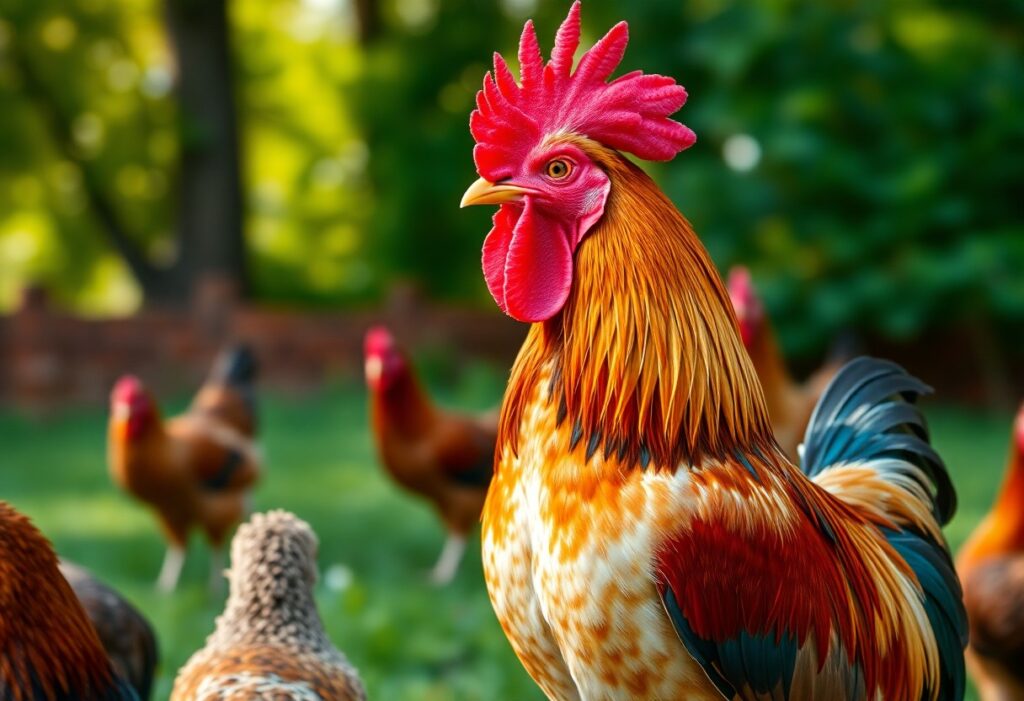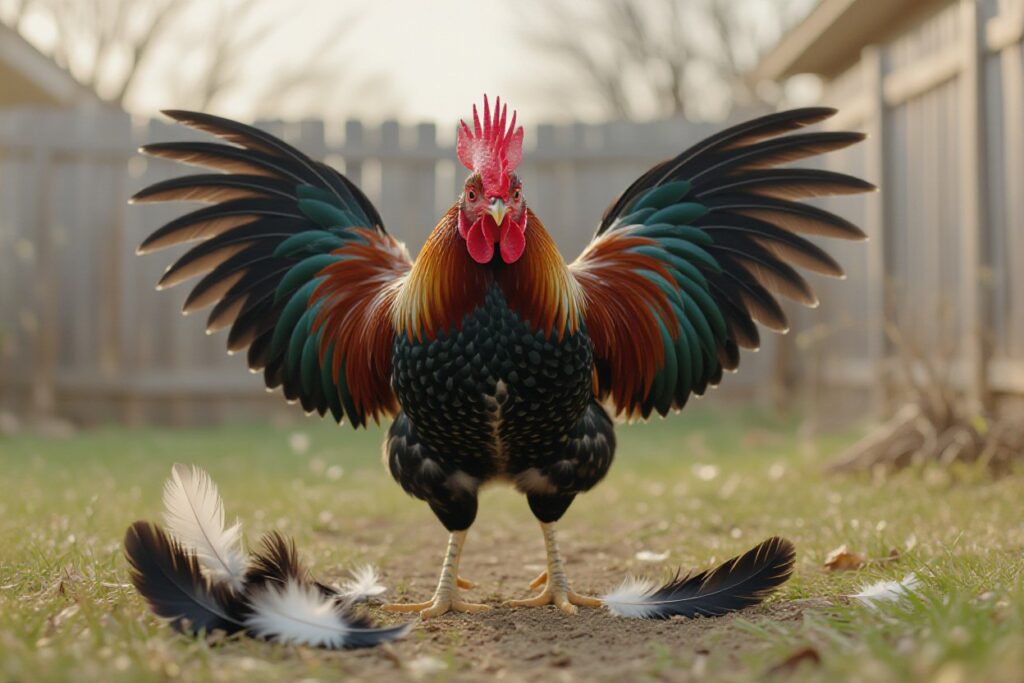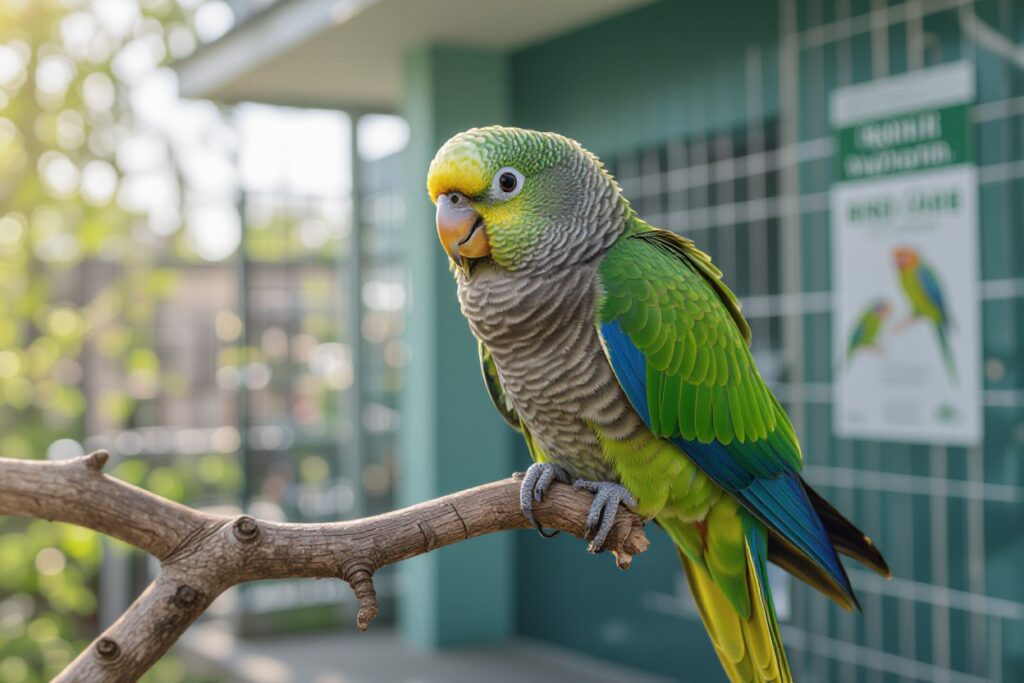Over time, you may notice specific indicators of a healthy rooster that can significantly enhance your flock’s well-being. A vibrant rooster is vital for the overall harmony of your chicken coop, and it’s important to regularly assess your bird’s behavior and physical condition. Look for clear eyes, a bright comb and wattles, and observant behaviors, as these suggest good health. Additionally, healthy roosters will demonstrate active feeding and social interactions with the hens, ensuring they’re not only thriving but also fulfilling their vital roles within the flock.
Key Takeaways:
- A healthy rooster displays bright, clear eyes and smooth, shiny feathers, indicating good overall health and well-being.
- Active behavior, such as crowing, foraging, and interacting with hens, signifies a rooster’s vitality and strong social role within the flock.
- Regular monitoring of body weight and a balanced diet contribute to the rooster’s health, helping to prevent issues like lethargy or aggressive behavior.
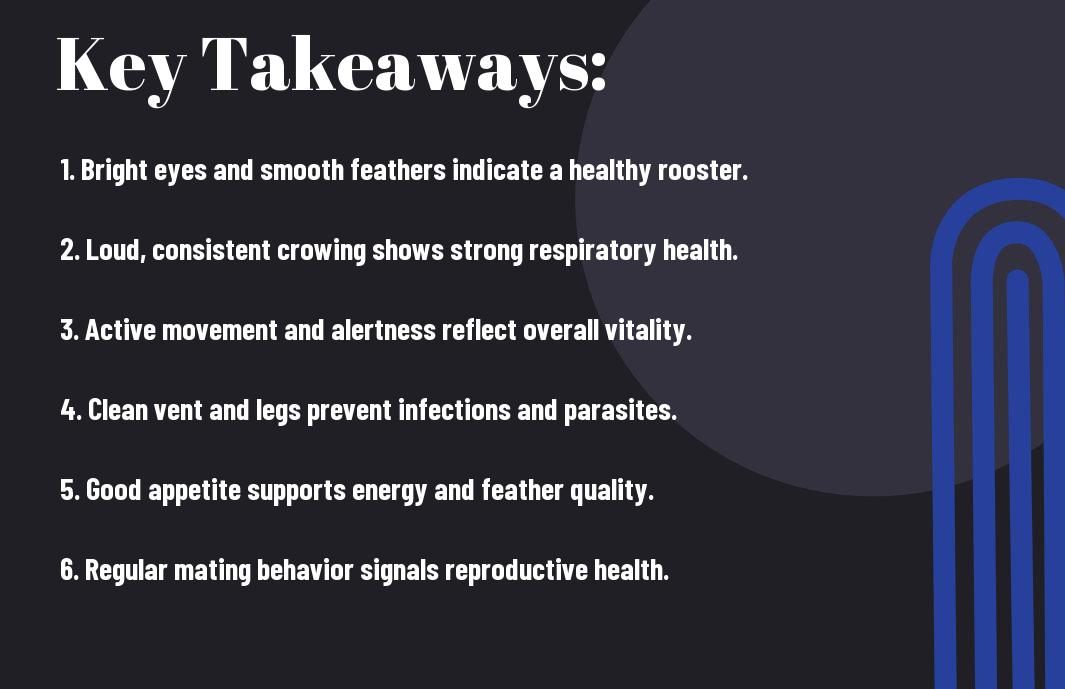
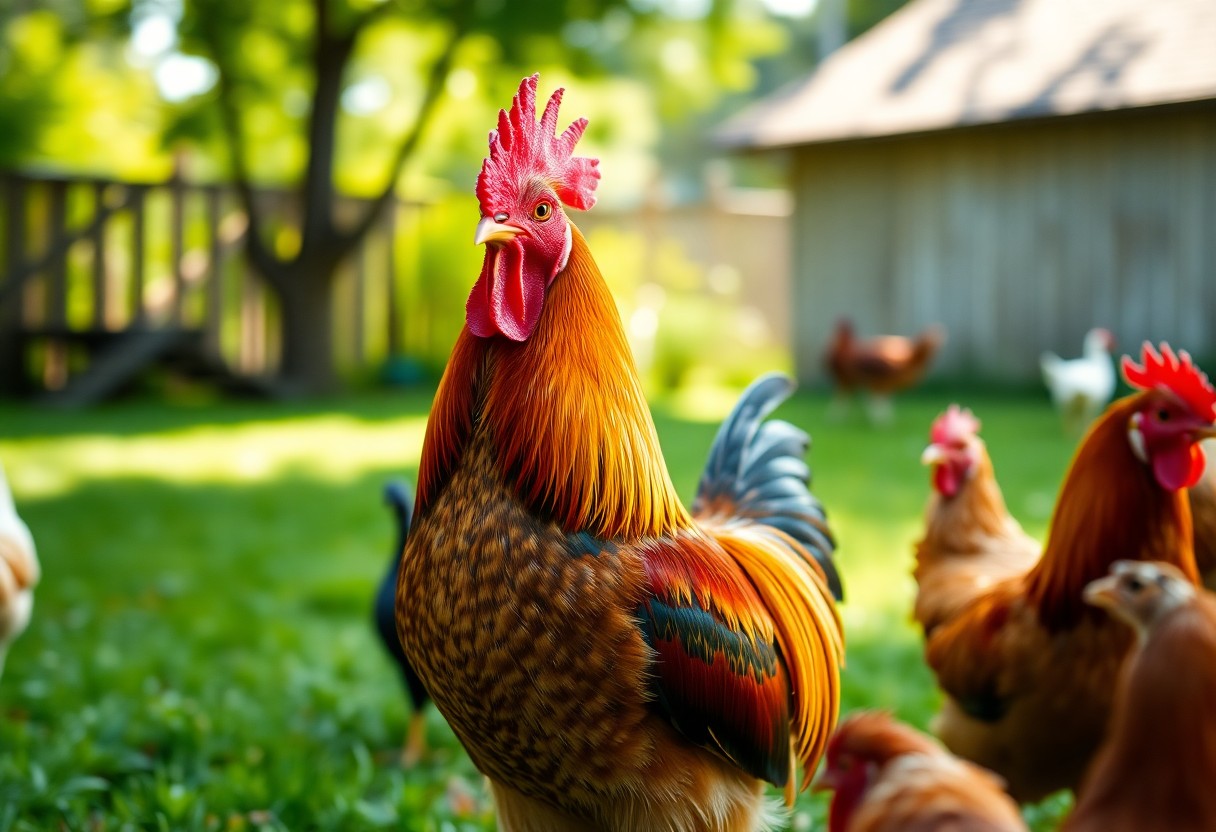
Physical Characteristics of a Healthy Rooster
For every chicken keeper, recognizing the physical characteristics of a healthy rooster is imperative. A healthy rooster exhibits vibrant plumage, a robust body, and alert eyes. These features not only signify health but also play a vital role in the overall well-being of your flock. When you ensure that your rooster meets these standards, you contribute positively to the productivity and harmony of your chicken yard.
Plumage Quality
On observing your rooster’s plumage, look for feathers that are smooth, shiny, and well-maintained. Healthy feathers should have a luster that reflects good nutrition and care. Dull or missing feathers can indicate nutritional deficiencies, parasitic infestations, or other underlying health issues that require immediate attention.
Body Condition
One of the key indicators of a healthy rooster is its body condition. You should assess your rooster’s weight, muscle mass, and overall posture. A robust rooster will have a firm, well-defined body that shows no signs of emaciation or excessive fat deposits.
Hence, maintaining a healthy body condition in your rooster involves providing a balanced diet and ensuring proper exercise. A rooster with a well-defined breast and muscular build indicates good health, while a thin or overweight bird can lead to serious health concerns such as reproductive issues and reduced vitality. Regularly check your rooster’s body condition to monitor its health and well-being, and make adjustments to its diet and activity level as necessary.
Behavioral Indicators
If you want to ensure that your rooster is healthy, observing his behavior is key. Healthy roosters display normal social interactions, engage in their surroundings, and exhibit lively behaviors. Look for signs like assertiveness, comfort in the flock, and a general sense of eagerness in activities. Any abrupt changes in behavior may indicate underlying health issues that need your attention.
Social Interactions
One of the first signs of a healthy rooster is his ability to interact well with other chickens. He should display confidence, establish a social hierarchy, and participate in communal grooming and feeding. If your rooster is overly aggressive or withdrawn, it may denote stress or health problems that require assessment.
Activity Levels
Along with social interactions, a rooster’s activity levels play a significant role in his overall well-being. Healthy roosters engage in a variety of activities such as foraging, dust bathing, and exploring their environment. When you observe your rooster being energetic and curious, it’s a strong sign that he is thriving.
With a healthy rooster, you should see consistent levels of activity and engagement. If your rooster is lethargic or shows signs of disinterest in foraging or interacting, it can be a sign of illness. Regularly monitoring his energy can help you identify potential health problems early, ensuring that he remains a vibrant and vital member of your flock.
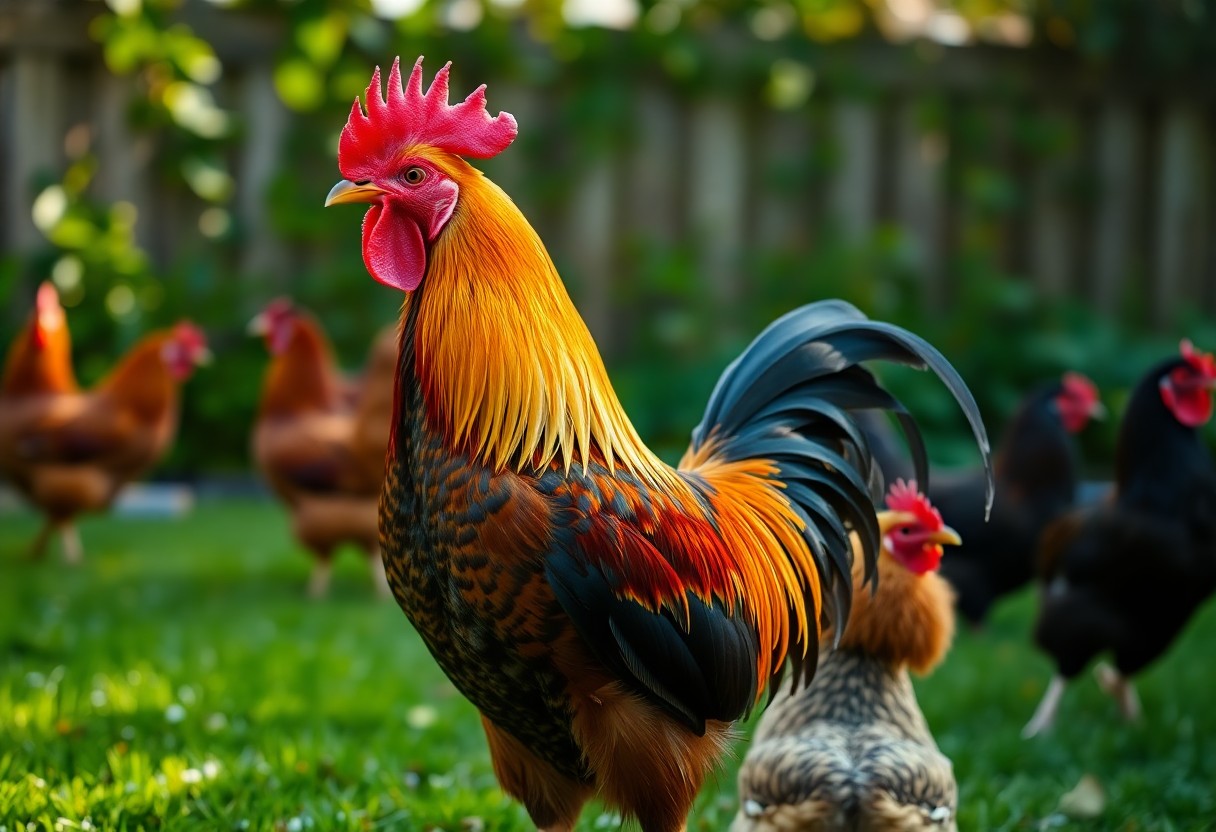
Vocalization Signs
Your rooster’s vocalizations can offer valuable insights into his health. A healthy rooster will exhibit a range of vocal sounds, including crowing, clucking, and purring. Pay attention to the tone and frequency of these sounds, as changes may indicate stress or illness. Regular, robust crowing and other vocalizations often signal a confident and healthy rooster, while any abnormal increases or decreases in vocal output should raise concern for potential health issues.
Crowing Patterns
Patterns of crowing can vary significantly among roosters and often indicate their health status. A healthy rooster typically has a consistent crowing pattern, which includes regular intervals and a clear pitch. Abnormal changes in his crowing style, like excessive crowing or a hoarse sound, can suggest discomfort or stress. Monitoring these patterns allows you to recognize when something may be wrong.
Communication with the Flock
With his various vocalizations, your rooster communicates important information to the flock. He uses sounds to warn against danger or to assert dominance. A healthy rooster will actively engage with his hens through clucking and soft coos, helping to create a strong bond within the flock. Understanding these interactions is vital, as a lack of communication may indicate problems. When a rooster is unable to communicate effectively, it can lead to disruption in the flock dynamics and potential issues like stress or aggression among the birds. Be attentive to these signs as they can reveal underlying health issues that need to be addressed promptly.
Nutritional Needs
Once again, providing your rooster with a balanced diet is necessary for his overall health and vitality. A well-nourished rooster not only thrives but also exhibits positive behaviors and contributes significantly to your flock’s dynamics. Pay close attention to his dietary requirements, which include protein, vitamins, minerals, and access to clean water. Proper nutrition enables your rooster to maintain a robust immune system, promoting better fertility and healthier offspring.
Balanced Diet Essentials
Before you can ensure your rooster’s health, it is important to understand the components of a balanced diet. A mix of high-quality poultry feed, grains, and access to fresh greens will provide necessary nutrients. The right combination supports his growth, energy levels, and overall well-being. Don’t forget to include calcium sources for strong bones and eggshells, especially if he’s part of a breeding program.
Signs of Nutritional Deficiency
Along with observing your rooster’s behavior, keep an eye out for signs of nutritional deficiency. You may notice symptoms such as reduced feather quality, weight loss, or lethargy. If your rooster appears to be less active and has a dull appearance, it may indicate that he is not receiving adequate nutrition.
To address these concerns effectively, monitor your rooster regularly to identify any changes in his health or behavior. Signs of deficiencies, such as brittle feathers, poor weight gain, and a dull comb or wattle, can indicate a lack of necessary vitamins, minerals, or protein in his diet. Ensuring your rooster gets a balanced diet can prevent serious issues, such as reproductive problems or an increased vulnerability to diseases. By proactively managing his nutritional needs, you contribute significantly to his long-term health and enhance the overall productivity of your flock.
Health Monitoring
Many chicken keepers overlook the importance of health monitoring for their roosters. Regular observation of your rooster’s behavior, appetite, and overall appearance can help you identify any signs of illness early on. A healthy rooster will exhibit bright eyes, clean feathers, and an active demeanor, while any deviation from this norm should prompt a closer look.
Regular Check-ups
Before symptoms appear, it’s wise to schedule regular veterinary check-ups for your rooster. A professional can provide valuable insights on vaccinations, parasite control, and general health assessments, ensuring your rooster remains in optimal condition.
Common Health Issues
On a day-to-day basis, be vigilant for common health issues in your rooster, such as respiratory infections, mites, or worms. If any signs of distress arise, seeking prompt veterinary assistance is crucial.
Monitoring your rooster’s health encompasses being aware of potential health issues like respiratory infections, which may present as coughing or nasal discharge, or external parasites like mites causing feather loss and irritation. Additionally, watch for signs of internal parasites such as weight loss or lethargy. If you notice unusual behavior, it’s vital to maintain a proactive approach by consulting your veterinarian promptly, as early intervention can lead to better outcomes for your flock.
Environmental Factors
Keep in mind that the environment plays a significant role in your rooster’s health. Ensuring the proper conditions can foster a robust and thriving bird. Focus on these key aspects:
- space
- housing
- cleanliness
- temperature
- social interaction
Recognizing these elements will help you create an optimal living space for your rooster.
Space and Housing
For your rooster to flourish, adequate space and housing are crucial. Each bird requires enough room to move freely, forage, and establish its territory, which can prevent skirmishes and promote a healthy social structure. A well-ventilated, dry coop can ward off diseases and create a comfortable environment for your rooster.
Impact of Stress on Health
Above all, stress can significantly affect your rooster’s overall health and behavior. Stressors such as overcrowding, poor living conditions, or lack of companionship can lead to serious health issues. You may notice signs of stress, including feather-picking, aggression, or a decline in egg production.
Considering the impact of stress, it’s crucial to maintain a peaceful environment for your rooster. Excessive stress can cause dangerous health problems, such as weakened immune response, increased vulnerability to diseases, and behavioral changes. You should monitor any triggers that may arise, such as new flock members or disturbances. By addressing these stressors, you can foster a positive atmosphere that promotes both physical and mental well-being for your rooster.
Conclusion
So, understanding the signs of a healthy rooster is crucial for every chicken keeper seeking to maintain a thriving flock. By observing their behavior, physical appearance, and overall vitality, you can ensure that your rooster contributes positively to your poultry environment. Regular health checks and attentive care will not only keep your rooster healthy but will also enhance the well-being of your entire flock. By paying closeattention to these signs, you can become a more informed and responsible chicken keeper.
Q: What are the physical characteristics of a healthy rooster?
A: A healthy rooster will display a bright and vibrant plumage, which indicates good health and nutritional status. The feathers should be smooth and well-groomed, without signs of bald patches or excessive molting. The body should be well-proportioned and not overly thin or excessively heavy. Additionally, a healthy rooster will have bright, clear eyes and clean, unblemished feet and legs. The beak should be strong and intact, showing no signs of deformities or issues that could hinder feeding.
Q: How can I tell if my rooster is behaving normally?
A: Normal behavior in a healthy rooster includes being alert, social, and displaying natural instinctive actions such as crowing, foraging, and interacting with hens. Healthy roosters often establish a pecking order within their flock and maintain a watchful eye for any potential threats. They should also engage in dust bathing and preening, which are signs of good health. If you notice significant changes in behavior such as lethargy, isolation from the flock, or abnormal crowing patterns, it could indicate underlying health issues.
Q: What signs indicate that a rooster is not healthy?
A: Signs of an unhealthy rooster can include unusual lethargy, a lack of interest in food or water, and failure to interact with other chickens. Physical indicators may manifest as weight loss, abnormal droppings, or signs of respiratory distress such as coughing or wheezing. Other symptoms include excessive feather pecking, skin lesions, or unusual swelling. If you observe any of these signs, it’s important to assess their environment, diet, and overall care, and consult a veterinarian if necessary to ensure the well-being of your rooster.
